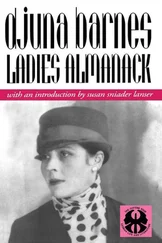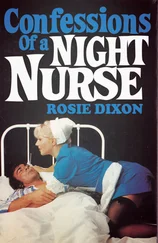‘What is she like?’ Nora asked.
‘Well,’ said the doctor, ‘I have always thought I, myself, the funniest looking creature on the face of the earth; then I laid my eyes on Jenny—a little, hurried decaying comedy jester, the face on the fool’s stick, and with a smell about her of mouse-nests. She is a “looter", and eternally nervous. Even in her sleep I’ll pronounce that her feet twitch and her orifices expand and contract like the iris of a suspicious eye. She speaks of people taking away her “faith” in them, as if faith were a transportable object—all her life she has been subject to the feeling of “removal". Were she a soldier she would define defeat with the sentence: “The enemy took the war away.” Having a conviction that she is somehow reduced, she sets about collecting a destiny—and for her, the sole destiny is love, anyone’s love and so her own. So only someone’s love is her love. The cock crew and she was laid—her present is always someone else’s past, jerked out and dangling.
‘Yet what she steals she keeps, through the incomparable fascination of maturation and rot. She has the strength of an incomplete accident—one is always waiting for the rest of it, for the last impurity that will make the whole; she was born at the point of death, but, unfortunately, she will not age into youth—which is a grave mistake of nature. How more tidy had it been to have been born old and have aged into a child, brought finally to the brink, not of the grave, but of the womb; in our age bred up into infants searching for a womb to crawl into, not be made to walk loth the gingerly dust of death, but to find a moist, gillflirted way. And a funny sight it would be to see us going to our separate lairs at the end of day, women wincing with terror, not daring to set foot to the street for fear of it.
‘But I’m coming by degrees to the narrative of the one particular night that makes all other nights seem like something quite decent enough —and that was the night when, dressed in open-work mittens, showing the edge of a pantaloon (and certainly they had been out of style three mothers behind her), Jenny Petherbridge—for that is her name in case you’d care to know it,’ he said with a grin, ‘wrapped in a shawl of Spanish insight and Madrid fancy (as a matter of fact, the costume came later, but what do I care?), stepped out in the early fall of the year to the Opera—I think, and I am not mistaken, it was nothing better than Rigoletto —walking in the galleries and whisking her eyes about for trouble—that she swore, even after, she had really never wanted to know anything about—and there laid her eyes on Robin who was leaning forward in a box, and me pacing up and down, talking to myself in the best Comédie-Française French, trying to keep off what I knew was going to be trouble for a generation, and wishing I was hearing the Schumann cycle—when in swishes the old sow of a Danish count. My heart aches for all poor creatures putting on dog and not a pot to piss in or a window to throw it from. And I began to think, and I don’t know why, of the closed gardens of the world where all people can make their thoughts go up high because of the narrowness and beauty, or of the wide fields where the heart can spread out and thin its vulgarity (it’s why I eat salad), and I thought, we should all have a place to throw our flowers in, like me who, once in my youth, rated a corbeille of moth-orchids—and did I keep them? Don’t get restless—I’m coming back to the point. No, I sat beside them a little while having my tea, and saying to myself; “You’re a pretty lot, and you do my cupboard honour, but there’s a better place awaiting you—” and with that I took them by the hand around to the Catholic church, and I said, “God is what we make Him, and life doesn’t seem to be getting any better,” and tiptoed out.
‘So, I went around the gallery a third time, and I knew that Hindu or no Hindu, I was in on what was wrong with the world—and I said the world’s like that poor distressed moll of a Jenny, never knowing which end to put its mittens on, and pecking about like a mystified rook, until this particular night gave her a hoist and set her up at the banquet (where she has been sitting dumbfounded ever since), and Robin the sleeping and troubled, looking amazed. It was more than a boy like me (who am the last woman left in this world, though I am the bearded lady) could bear, and I went into a lather of misery watching them, and thinking of you, and how in the end you’ll all be locked together, like the poor beasts that get their antlers mixed and are found dead that way, their heads fattened with a knowledge of each other they never wanted, having had to contemplate each other, head-on and eye to eye, until death; well, that will be you and Jenny and Robin. You, who should have had a thousand children and Robin, who should have been all of them; and Jenny the bird, snatching the oats out of love’s droppings—and I went mad, I’m like that. What an autopsy I’ll make, with everything all which ways in my bowels! A kidney and a shoe cast of the Roman races; a liver and a long-spent whisper, a gall and a wrack of scolds from Milano, and my heart that will be weeping still when they find my eyes cold, not to mention a thought of Cellini in my crib of bones, thinking how he must have suffered when he knew he could not tell it for ever—(beauty’s name spreads too thick). And the lining of my belly, flocked with the locks cut off love in odd places that I’ve come on, a bird’s nest to lay my lost eggs in, and my people as good as they come, as long as they have been coming, down the grim path of “We know not” to “We can’t guess why".
‘Well, I was thinking of you, a woman at best, and you know what that means? Not much in the morning—all trussed up with pain’s bridle. Then I turned my eyes on Jenny, who was turning her eyes looking for trouble, for she was then at that pitch of life that she knew to be her last moment. And do you need the doctor to tell you that that is a bad strange hour for a woman? If all women could have it all at once, you could beat them in flocks like a school of scorpions; but they come eternally, one after the other, and go head foremost into it alone. For men of my kind it isn’t so bad, I’ve never asked better than to see the two ends of my man no matter how I might be dwindling. But for one like Jenny, the poor ruffled bitch, why, God knows, I bled for her, because I knew in an instant the kind of a woman she was, one who had spent all her life rummaging through photographs of the past, searching for the one who would be found leaning sideways with a look as if angels were sliding down her hip—a great love who had been spared a face but who’d been saddled with loins, leaning against a drape of Scotch velvet with a pedestal at the left twined with ivy, a knife in her boot and her groin pouting as if she kept her heart in it. Or searching among old books for the passion that was all renunciation and lung trouble, with flowers at the bosom—that was Jenny—so you can imagine how she trembled when she saw herself going toward fifty without a thing done to make her a tomb-piece, or anything in her past that would get a flower named for her. So I saw her coming forward, stepping lightly and trembling and looking at Robin, saying to me (I’d met her, if you call it meeting a woman when you pound her kidney), “Won’t you introduce me?” and my knees knocking together; and my heart as heavy as Adam’s off ox, because you are a friend of mine and a good poor thing, God knows, who will never put a stop to anything; you may be knocked down, but you’ll crawl on for ever, while there’s any use to it, so I said, “Certainly, damn it!” and brought them together. As if Robin hadn’t met enough people without me making it worse.’
Читать дальше












